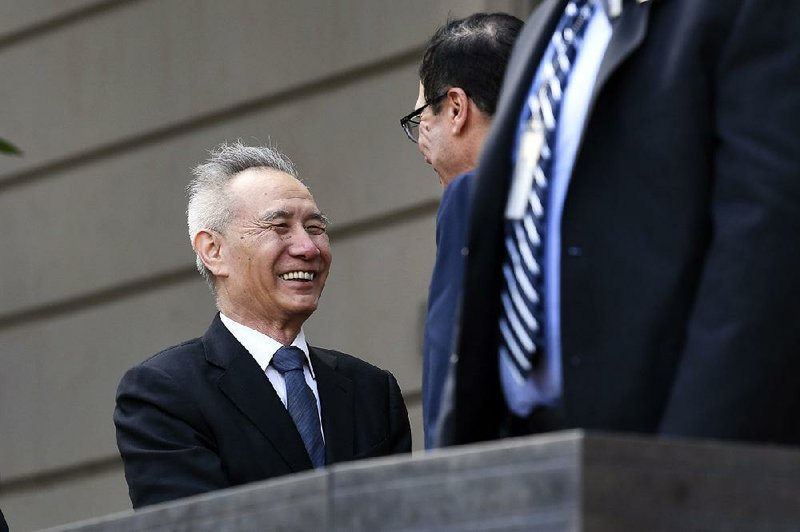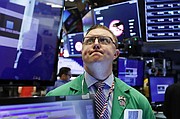Tariffs on $200 billion worth of Chinese goods increased today after a pivotal round of trade talks Thursday evening between the United States and China failed to produce an agreement to forestall the higher levies.
President Donald Trump, in comments Thursday afternoon at the White House, said he would raise the tariffs from 10% to 25% on $200 billion worth of Chinese goods and take steps to tax nearly all of China's imports as he accused Beijing of backtracking on a trade deal.
The White House said talks would continue today between top Trump administration officials and Chinese negotiators but it remains uncertain whether the two sides can bridge the differences that have arisen over the past week.
China immediately said in a statement that it is forced to retaliate, but didn't specify how.
Chinese Vice Premier Liu He arrived Thursday at the U.S. trade representative's office in Washington to start two days of talks with American officials including Robert Lighthizer, the top U.S. negotiator, and Treasury Secretary Steve Mnuchin.
Earlier Thursday, Trump calmed U.S. financial markets after he insisted it was still possible to reach a deal this week, even as he reiterated plans to raise tariffs on Chinese goods. Trump, speaking at an event in Washington, also said he may hold a phone call with his Chinese counterpart, Xi Jinping.
"He just wrote me a beautiful letter, I just received it, and I'll probably speak to him by phone but, look, we have two great alternatives, our country is doing fantastically well," Trump said. "Our alternative is an excellent one, it's an alternative I've spoken about for years. We've taken well over $100 billion from China in a year."
No call between the two leaders had taken place by late Thursday nor had one been scheduled, according to a senior Trump administration official.
The mood on both sides going into the talks had appeared to be hardening with Lighthizer calling members of Congress to warn them that an agreement this week is unlikely, according to people familiar with the conversations.
While Trump insisted Wednesday that Liu was coming to make a deal and dubbed him a "good man," he later told a rally of supporters that China "broke the deal" by backsliding on previous commitments, leading him to order higher tariffs.
China has disputed Trump's characterization, but it has also sent its own signals that a deal could take time.
"China is credible and honors its word and that has never changed," Commerce Ministry spokesman Gao Feng told reporters Thursday. The Commerce Ministry also announced that it would soon publish details of new retaliatory tariffs.
Vice President Mike Pence said Thursday that the Trump administration was working "literally hour by hour" to reach an agreement.
Flanked by farmers and ranchers invited to a northwestern Minnesota farm to talk about the new North American trade agreement, Pence said the U.S. is going to "continue to stand firm" to reset an unbalanced trading relationship.
Pence said "you can be very confident" that the administration is going to "look for ways" to provide additional support to farmers affected by the trade dispute. He was not specific.
China has already placed tariffs on nearly all of America's exports, including agriculture products.
Lyle Benjamin, the president of the Montana Grain Growers Association, said that China had essentially stopped buying American wheat since last year. He was hopeful that a trade truce would change that, but now he expected prices to keep falling.
"It's highly frustrating, particularly in the agricultural sector, to be collateral damage as we try to achieve these trade goals for other industries," Benjamin said.
The Trump administration has done projections on the effect of the additional tariffs on the economy and believes the negative effects will be minimal and pale in comparison to those facing China, an administration official said.
"To the president's credit, the tariffs are working," said Dan DiMicco, chairman of the trade lobbying group Coalition for a Prosperous America and a trade adviser to Trump during his 2016 campaign. "America's manufacturers and workers are now seeing gains as manufacturing employment rises and China's hold on the U.S. market shrinks."
Data released Thursday offered Trump a chance to claim his tariff war is yielding the desired result. The U.S. trade deficit with China decreased to the narrowest in almost three years as imports slowed and exports advanced.
The United States and China had been nearing a trade deal that would lift tariffs, open the Chinese market to U.S. companies and strengthen China's intellectual property protections. But discussions fell apart last weekend, when China called for substantial changes to the negotiating text that both countries had been using as a blueprint for a sweeping trade pact.
The higher U.S. tariffs will hit many consumer products that Americans rely on from Beijing, such as seafood, luggage and electronics, raising prices for U.S. companies and their customers across a large portion of sectors.
The higher tariffs will hit only products that leave China as of today, not those already in transit. That could provide some additional time for the two sides to reach an agreement. Trump also could rescind the tariffs once a deal is reached, retroactively reversing the higher rates.
"This week is really a challenge if you've got boats on the ocean," said Brian Keare, the field chief information officer at Incorta, who advises companies such as Broadcom, Starbucks and Apple on scenario planning amid the uncertainty they face under the Trump administration. "If I've got 30 days' notice, I can make a smarter decision. If I've got 72 hours, my hands are more tied."
It remains unclear whether the talks can get back on track. An administration official described Xi's letter to Trump as conveying a diplomatic tone but noted that the word "equality" was included, suggesting that China believes the United States is demanding too much and that a trade agreement must be more equitable. Xi also said he believed that his friendship with Trump would endure the trade dispute.
Information for this article was contributed by Ye Xie, Jennifer Jacobs, Shawn Donnan, Dandan Li, Alyza Sebenius, Saleha Mohsin, Kathleen Miller, Millie Munshi, Sophie Caronello, Jenny Leonard and Miao Han of Bloomberg News; by Alan Rappeport and Ana Swanson of The New York Times; and by Dave Kolpack of The Associated Press.
A Section on 05/10/2019


